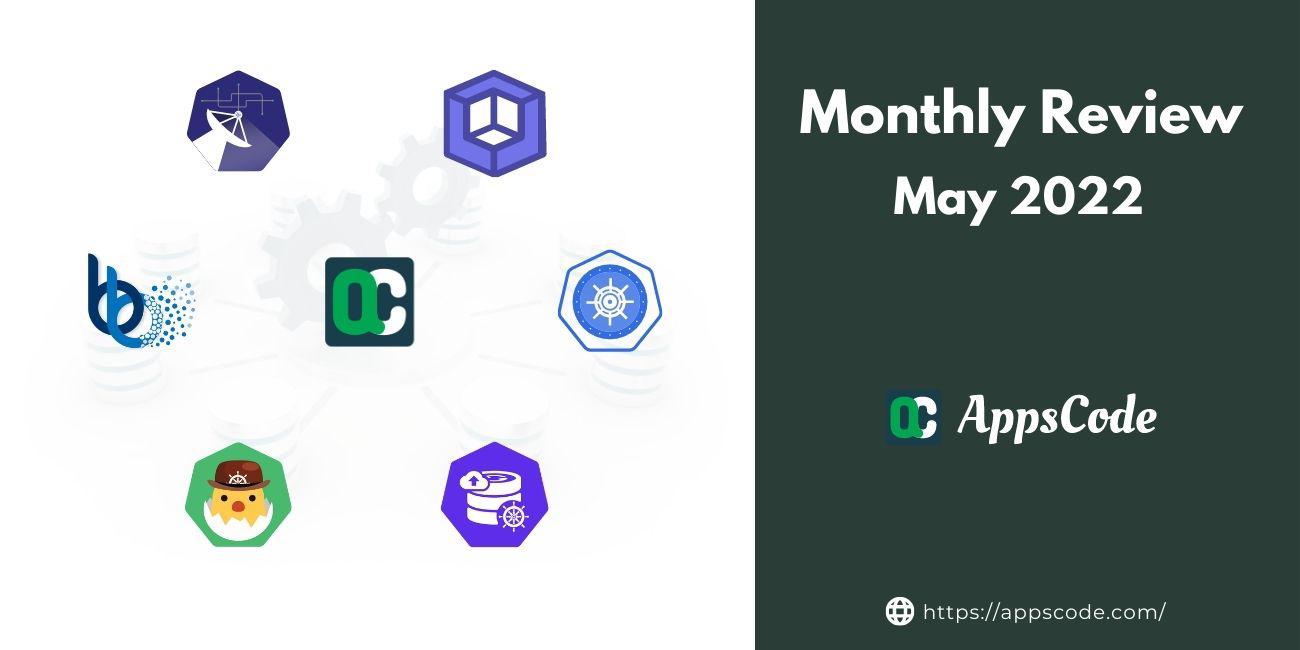
Releases
Announcing KubeDB v2022.05.24
We are pleased to announce the release of KubeDB v2022.05.24. This post lists all the major changes done in this release since the last release. This release offers some major features like MySQL Semi-Synchronous Replication, MongoDB Arbiter, PGBouncer, MariaDB Schema Manager, ProxySQL, Redesigned Redis, Elasticsearch V8, OpenSearch Dashboard, etc. It also contains various improvments and bug fixes.
Link: https://appscode.com/blog/post/kubedb-v2022.05.24/
Introducing Stash v2022.05.18
We are very excited to announce Stash v2022.05.18. In this release, we have added a few new features and improvements. We have squashed a few bugs as well.
Link: https://appscode.com/blog/post/stash-v2022.05.18/
Introducing Stash v2022.05.12
We are very excited to announce Stash v2022.05.12. In this release, we have added exciting new features and improvements. We have squashed a few bugs as well.
Link: https://appscode.com/blog/post/stash-v2022.05.12/
Webinars
PostgreSQL Connection Pooling in Kubernetes using Kubedb PgBouncer
On 25th May 2022, AppsCode held a webinar on PostgreSQL Connection Pooling in Kubernetes using Kubedb PgBouncer.
Link: https://appscode.com/blog/post/webinar-2022.05.25-kubedb-pgbouncer/
Challenges of Autoscaling Databases in Kubernetes
On 18th May 2022, AppsCode held a webinar on Challenges of Autoscaling Databases in Kubernetes.
Link: https://appscode.com/blog/post/webinar-2022.05.18-kubedb-auto_scaling/
Blogs Published
Running Production-Grade Databases on Kubernetes - Challenges and Solutions
Link: https://appscode.com/blog/post/running-databases-on-kubernetes/
Use Loki with KubeDB
For many years, logs have been an essential part of troubleshooting application and infrastructure performance. In Kubernetes, the logging mechanism becomes more crucial to managing and monitoring services and infrastructure. In this post, we are going to give you a full setup guide about Grafana Loki setup for collecting logs from KubeDB pods and how you can generate alerts based on those logs.
Link: https://appscode.com/blog/post/loki-setup-kubedb/
Run MySQL in Azure Kubernetes Service (AKS) Using KubeDB
KubeDB simplifies Provision, Upgrade, Scaling, Volume Expansion, Monitor, Backup, Restore for various Databases in Kubernetes on any Public & Private Cloud. Here is how to Run & Manage MySQL in Azure Kubernetes Service (AKS) Using KubeDB.
Link: https://appscode.com/blog/post/run-mysql-in-aks/
Support
To speak with us, please leave a message on our website .
To receive product announcements, follow us on Twitter .
Follow our Linkedin for more AppsCode Inc
To watch tutorials of various Production-Grade Kubernetes Tools Subscribe our YouTube channel.










